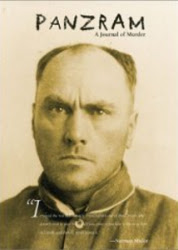
I’ve just finished reading Panzram: A Journal of Murder, by Thomas E. Gaddis and James O. Long. It’s about a serial killer, rapist (mostly of men and boys), arsonist, thief, batterer, and conspirator (albeit largely failed). I’m sure I’ve left something out. I’m interested in what makes people do such evil (and often just plain weird) things. This book bothered me from the start, though, and I almost stopped reading it. The thing was, I felt empathy for the serial killer, and that’s a scary thought. Usually I’m a mix of sadness and perverse amusement at what lengths people will go to to hurt people for no reason. People can be very creative in their meanness. But this guy was abused, neglected, raped, and in reform school (a century ago) by the time he was eleven, where the abuse and neglect were carried to new heights while the rape continued. So he became a rapist, a random serial killer who hated mankind (including himself) and felt no remorse for what he’d done. I guess my empathy would end there. I’d feel remorse. But I can understand his wanting to get revenge, I guess. I made a lot of promises to myself when I was little – not that I would go on a killing spree or anything, but just that I would remember what happened then when I grew up. I have a reputation in my family for one who holds a grudge. It’s true. I promised a little girl I would remember her.
I forced myself to finish the book despite my discomfort. What I am coming out of this book with is the message that “[d]o unto others as you would have them do to you” (Luke 6:31, KJV) is not so much a rule that Christians (and humane people in general) should live by but one that anyone with common sense should live by out of self-preservation if not humanity. I don’t know what a modern psychiatrist or FBI criminologist would make of Carl Panzram, but I suspect that if he’d been treated better earlier in his crime spree (which began with public drunkenness at the age of eight), he wouldn’t have been the monster he became. So whether you want Jesus to love you, to be a humane individual, or just look out for number one, you ought to be kind to people. Not a new idea, but I’m glad I finished the book.
When he finally gets hanged (not a spoiler, as it’s in the introduction), he says something to his hangman that I think is a wonderful, if nasty, expression of the individual: “Hurry it up, you Hoosier bastard! I could hang a dozen men while you’re fooling around!” You have to admire his spunk, if not his actions.
I’m not so worried about my occasional empathy with the guy anymore. He had a far rougher childhood than mine. He just never forgot what people had done to him. I must stress that I don’t approve of or empathize with his actions, just to get that straight. I simply have a sadness not just for Panzram’s victims but for himself.
Sunday, March 9, 2008
Do unto others before they do unto you?
Labels:
Bible,
Christianity,
conscience,
death,
free will,
kindness,
life,
morality,
principles,
religion
Subscribe to:
Post Comments (Atom)



No comments:
Post a Comment